| 1 |
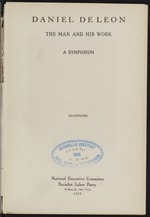 |
“...DANIEL DE LEON
THE MAN AND HIS WORK
A SYMPOSIUM
ILLUSTRATED
4:,/V
National Executive Committee
Socialist Labor Party
45 Roe Si., Ntw York
1920...”
|
|
| 2 |
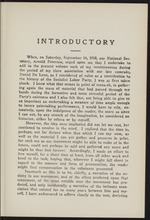 |
“...could not perhaps be said and gathered any more and
might be thus lost forever. Accordingly, I made an effort to
free myself, for a short time at least, from all other work and
bend to the task, hoping that, wherever I might fall short in
regard to the manner and form of presentation, the reader
might find compensation in the substance presented.
^ ^ Inasmuch as this is to be, chiefly, a narrative of the ac-
tivity in our movement, and of the effect produced upon that
movement, of the most notable man the movement has pro-
duced, and only incidentally a narrative of the intimate asso-
ciation that existed for so many years between him and my-
self, I have endeavored to adhere closely to the text, deviating...”
|
|
| 3 |
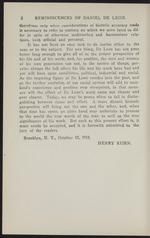 |
“...has not been an easy task to do justice either to the
man or to the subject. For one thing, De Leon has not gone
hence long enough to give all of us the proper perspective of
his life and of his work; and, for another, the men and women
of his own generation can not, in the nature of things, per-
ceive always the full effect his life and his work have had and
yet will have upon conditions, political, industrial and social.
As the imposing figure of De Leon recedes into the past, and
as the further evolution of our social system will add to man-
kinds experience and produce new viewpoints, in that meas-
ure will the effect of De Leons work come out clearer and
ever clearer. Today, we may be prone often to fail in distin-
guishing between cause and effect. A more distant historic
perspective will bring out the one and the other, and, when
that time has come, an abler hand may undertake to present
to the world the true worth of the man as well as the true
significance of his work. But such...”
|
|
| 4 |
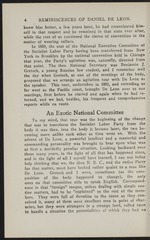 |
“...became later, the two be-
coming more unlike each other as time went on. With the
advent of De Leon, a powerful intellect and a masterful and
commanding personality was brought to bear upon what was
at first a decidedly peculiar situation. Looking backward over
these many years, in the light of all that has happened since,
and in the light of all I myself have learned, I can not today
help thinking that we, the then N. E. C., and the entire Party
for that matter, must have looked rather quaint to a man like
De Leon. Gretsch and I were, sometimes (as the com-
position of the body happened to change), the only
ones on that committee able to speak English. Correspond-
ence in that foreign tongue, unless dealing with simple rou-
tine matters, had to be explained to the rest of the mem-
bers. They were full of devotion to the cause as they. con-
ceived it, many of them were excellent men in point of char-
acter, but they were strangers in a strange land, called upon
to handle a situation the pote...”
|
|
| 5 |
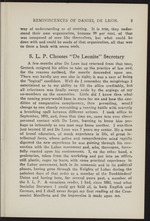 |
“...of my
co-members on the committee. Little did I know then w'hat
the coming yearswould have in store for me and how the con-
dition of comparative complacency, then prevailing, woul.1
change to one closely resembling a running battle with scarcely
a breathing spell between different actions. I took office in
September, 1891, and, from that time on, came into ever closer
personal contact with De Leon, learning to know him per-
haps as intimately as one man may know another. I was then
just beyond 32 and De Leon was 7 years my senior. He a man
of broad education, of much experience in life, of great in-
tellectual force, whose active and comprehensive mind rapidly
digested the new experience he was gaining through his con-
nection with the Labor movement and, who, thereupon, force-
fully reacted upon his environment. I, on the other hand, a
proletarian, taken from the workshop and put into an office,
still plastic, eager to learn, with some practical experience in
the Labor movement, both in...”
|
|
| 6 |
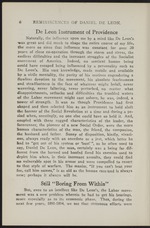 |
“...strength. It was as though Providence had first
shaped and then selected him as an instrument to hold aloft
Ac banner of the Social Revolution at a time and during a pe-
nod when, seemingly, no one else could have so held it. And,
oupled with these rugged characteristics of the leader, the
forerunner, the pioneer of a new Social Order, were the more
kozaan characteristics of the man, the friend, the companion,
lite husband and father. Sunny of disposition, kindly, vivaci-
wts, always ready with an anecdote or a jest, which latter he
lad to get out of his system or bust as he often used to
say, Daniel De Leon, the man, certainly was a being far dif-
ferent from the horned and hoofed fiend his enemies used to
depict him when, in their incessant assaults, they could find
ao vulnerable spot in his armor and were compelled to resort
to that style of warfare. The maxim, If you cant beat your
foe, call him names, is as old as the human race rand is always
new; perhaps it always will be.
Still Boring...”
|
|
| 7 |
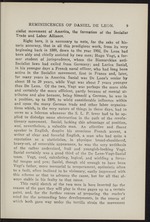 |
“... being himself a German, he was in
a position, up to 1899, to wield considerable influence within
and upon the many German trade and other labor organiza-
tions which, in the very nature of things in those days, had to
serve as a fulcrum whenever the S. L. P. lever had to be ap-
plied to dislodge some obstruction in the path of the revolu-
tionary movement. Sanial, lacking this advantage of position,
was, nevertheless, a valuable man. An effective and fluent
speaker in English, despite his atrocious French accent, a
writer of clear and forceful English, a man who had quite a
reputation as a statistician, in physique broad-shouldered,
heavy-set, of venerable appearance, he was the very antithesis
of the rather undersized, frail and youngish-looking Vogt.
Sanial certainly was a good third of the De Leon-Vogt-Sanial
team. Vogt, cool, calculating, logical, and wielding a force-
ful tongue and pen; Sanial, though old enough to have been
Vogt s father, more mercurial in temperament, optimistic...”
|
|
| 8 |
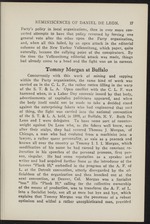 |
“...secured Thomas J. Morgan, of
Chicago, a man who had evoluted from a machinist into a
lawyer, a rather queer personality, as vain as a peacock and
known all over the country as Tommy I. I. I. Morgan, which
modification of his name he had earned by the constant re-
iteration in his speeches of the personal pronoun, first per-
son, singular. He had some reputation as a speaker and
writer and had acquired further fame as the introducer of the
famous "Plank 10," embodied in the program of the A. F. of
L. at the Detroit convention, utterly disregarded by the of-
ficialdom of the organization and then knocked out at the
next convention, at Denver, Col. Morgan was a Socialist
"too." His Plank 10, calling for the collective ownership
of the means of production, was to transform the A. F. of L.
into a Socialist body, not all at once but bye and bye, which
explains that Tommy Morgan was the possessor of a robust
optimism and withal a rather unsophisticated man, provided...”
|
|
| 9 |
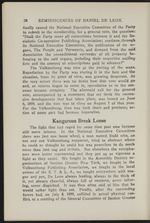 |
“...became certainty. The aforesaid call for the genera!
vote, accompanied by a statement that set forth the succes-
sive developments that had taken place, was issued on June
6, 1899, and the vote was to close on August 1 of that year.
For the Volkszeitung, time was both short and precious; ac-
tion of some sort had become imperative.
Kangaroos Break Loose
The fight that had raged for some time past now became
still more intense. In the National Executive Committee
there was just one loose wheel, a man named Stahl who, a
out and out Volkszeitung supporter, tried to obstruct where
he could Or thought he could but was powerless to do much
more than just nag and irritate. But elsewhere the conspira-
tors were better represented and they put up as vigorous a
fight as they could. We fought in the Assembly District or-
ganizations of Section Greater New York, we fought in the
Volkszeitung Publishing Association, we fought in the local
unions of the S. T. & L. A., we fought everywhere with ton-
gue...”
|
|
| 10 |
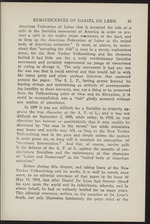 |
“...attitude of uncompromis-
ing hostility to these interests, was not a thing to be preserved
from the Volkszeitung point of view and its disruption, if it
could be accomplished, was a risk gladly assumed without
any qualms of conscience.
In 1899 it was not difficult for a Socialist to properly ap-
praise the true character of the A. F. of L.; and it was not
difficult on September 2, 1909, while today, in 1918, its true
character has become so unmistakable that it may readily be
discerned by "the man in the street, but while mountains
may heave and worlds may fall, so long as the New Yorker
Volkszeitung sees in the pure and simple unions the pasture
it must graze on, so long will it maintain its conception of
"economic determinism. And that, of course, carries with
it the defense of the A. F. of L. against the assaults of rev-
olutionary Socialism and the maintenance of that champion
of "Labor and Democracy as the united body of American
unionism.
Before closing this chapter, and taking leave...”
|
|
| 11 |
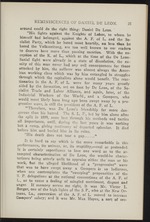 |
“...REMINISCEN'CES OF DAX^IEL DE LEON. 25
around could do the right thing: Daniel De Leon.
"His fights against the Knights of Labor, to whom he
himself had belonged, against the A. F. of L. and the So-
cialist Party, which he hated most heartily, no less than he
hated the Volkszeitung, are too well known to our readers
to deserve here more than passing mention. With the ex-
ception of the K. of L., which at the time of the De Leon-
Samal fight were already in a state of dissolution, the en-
mity of this man never had any evil consequences for those
attacked by him, the sufferer was almost always the Amer-
lean working class which was by him entangled in struggles
through which the capitalists alone would benefit. The reac-
onaries in the A. F. of L. were for many years greatly
aided by the formation, set on foot by De Leon, of the So-
cialist Trade and Labor Alliance, and again, later, of the
Industrial Workers of the World, and a Gompers, who
would most likely have long ago been swept away by a pro-...”
|
|
| 12 |
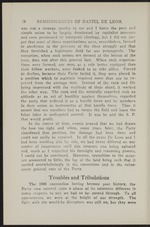 |
“...obedience to the pressure of the class struggle and that
they furnished a legitimate field for our propaganda. The
exception, when such unions are formed at the behest of the
boss, does not alter this general fact. When such organiza-
tions were formed, our men, as a rule better equipped than
their fellow workers, w'ere looked to to take office. Forced
to decline, because their Party forbid it, they were placed in
a position which to maintain required more than can be ex-
pected from the average man. Instead of the rank and file
being impressed with the rectitude of their stand, it worked
the other way. The rank and file naturally regarded such an
attitude as an act of hostility against themselves, regarded
the party that ordered it as a hostile force and its members
in their union as instruments of that hostile force. Thus it
meant that our members had to vacate the field and leave the
labor faker in undisputed control. It was he and the S. P.
that would profit.
In the course of time, events...”
|
|
| 13 |
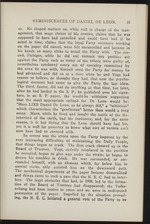 |
“...REMINISCENCES OF DANIEL DE LEON. 31
us. He shaped matters so, while still in charge of the man-
agement, that wage claims of his cronies, claims that he was
supposed to have had cancelled and could have had if he
acted in time, claims that the loyal Party members working
on the paper did cancel, were left uncancelled and became in
his hands so many clubs to assail the Party with. The sec-
ond, Fiebiger, while he did not commit any positive act
against the Party such as many of the others were guilty of,
nevertheless condoned every act of rascality committed by
the crew he was with, himself sued the Party for money he
had advanced and did so at a time when he and Vogt had
reason to believe, or thought they had, that now the psycho-
logical moment had come to give the Party the last blow.
The third. Sauter, did not do anything at that time, but later,
after he had landed in the S. P., he published over his signa-
ture, in an S. P. paper, the would-be witticism suggestin,g
that the most a...”
|
|
| 14 |
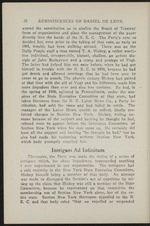 |
“...32 REMINISCENCES OF DANIEL DE LEON.
arnend the constitution as to abolish the Board of Trustees
form of organization and place the management of the paper
directly into the hands of the N. E. C. The Partys vote so
decided but, even prior to the taking of that vote, as early as
1901, trouble had been stalking abroad. There was on the
Daily People staff a man named T. A. Hickey, a rather worth-
less individual, irresponsible, blatant, shallow, an ardent dis-
ciple of John Barleycorn and a crony and protege of Vogt.
The latter had helped him out once before, when he had got
himself in trouble with the N. E. C. in 1900, because he had
got drunk and allowed meetings that he had been sent to
cover to go to smash. The phyrric victory Hickey had gained
at that time with the aid of Vogt and his followers, made him
more impudent than ever and also less cautious. He had, in
the spring of 1900, agitated in Pennsylvania, under the aus-
pices of the State Executive Committee of that state, had
taken...”
|
|
| 15 |
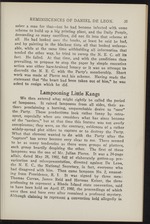 |
“...REMINISCENCES OF DANIEL DE LEON. 35
sober a man for thatbut he had become infected with some
scheme to build up a big printing plant, and the Daily People,
demanding so many sacrifices, did not fit into that scheme at
all. He had looked over the books, at least he said he had
and by painting in the blackest tints all that looked unfavor-
able, while at the same time withholding all information that
tended the other way, he tried to sweep the N. E. C. off its
feet. He failed. At that time, and with the conditions then
prevailing, to propose to stop the paper by simple executive
action was either hare-brained lunacy or it was an attempt to
discredit the N. E. C. with the Partys membership. Short
work was made of Pierce and .his scheme. Having made the
statement that the heart had been taken out of him," he was
asked to resign which he did.
Lampooning Little Kangs
We then entered what might rightly be called the period
of lampoons. It rained lampoons from all sides, their au-
thors proclaiming...”
|
|
| 16 |
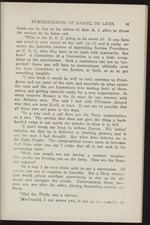 |
“...of a Convention is not a body recoo--
mzed by the constitution. Such a committee can not be sus-
pended. Guess you will have to communicate officially with
luc State Committee or the Section, or both, so as to get
something tangible.
I also think it would be well to send someone to Provi-
dence, and some of the men, and ascertain to what extent
the rank and file are hypnotized into making fools of them-
ves, an getting material ready for a new organization. In
many respects Brower is the fit man; he can connect with
our Alliance men. The talk I had with O'Connor showed
that they are onto Kroll, at least. It can not be possible that
all those men are gone to the dogs.
to alesf "tT organizations
to a test. The section that does not give the thing a back-
handed swipe is not worth the powder to blow it to hell.
I dont break my head to fathom Curran. His policy
satisfies me that he is deficient in thinking powers and is
'^''Sht. But what does interest me is
Jid fr? yPOg'-aphical errors seem...”
|
|
| 17 |
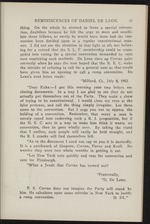 |
“...late these fellows, as surely he would have done had the con-
vention been decided iipon in a regular constitutional man-
ner. I did not see the situation in that light at all, not believ-
ing for a second that the S. L. P. membership could be stam-
peded into voting for a special convention demanded by such
men employing such methods. De Leon sizes up Curran quite
correctly when he says the man hoped that the N. E, C. make
the mistake of refusing to call for a general vote as that would
have given him an opening to call a rump convention. De
Leons next letter reads;
Milford, Ct., July 8, 1902.
morning your two letters en-
I am glad to see they do not
the Party. They make a show
I would close my eyes at the
false pretense, and call the thing simply irregular. Let them
come to the convention. But I urge you not to oppose the
holding of a convention. Remember, that many a man is
merely roped into endorsing such a R. I. proposition, but if
the N. E. C. acts in a way to make him think it wants...”
|
|
| 18 |
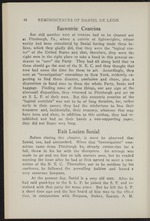 |
“...must be observed that
Sanial, too, had succumbed. When that investigation com-
mittee came .from Pittsburgh he, already rotten-ripe for a
fall, threw in his lot with the disrupters. An attempt was
made to go and see him to talk matters over, but he evaded
meeting the issue after he had at first agreed to meet a com-
mittee of the N. E. C. Thereafter, not to be outdone by his
confreres, he followed the prevailing fashion and issued a
very sonorous lampoon.
At the present day, Sanial is a very old man. After he
had said good-bye to the S. L. P. he joined the S. P. and re-
mained with that party for some years. But he left the S. P.
a short time ago and the last heard of him was to the effect
tliat, in conjunction with Simpson, Stokes, Spargo, A. M....”
|
|
| 19 |
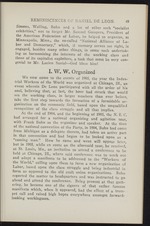 |
“...formidable or-
ganization on the economic field, based upon the unqualified
reco,gnition of the class struggle and all that implies.
At the end of 1904, and the beginning of 1905, the N. E. C.
had arranged for a national organizing and agitation tour,
with Frank Bohn as the organizer and speaker. At the time
of the national convention of the Party, in 1904, Bohn had come
from Michigan as a delegate thereto, had taken an active part
in that convention and had begun to be looked upon as a
coming man. How he came and went will appear later,
but in 1905, while en route on the aforesaid tour, he received
at St Louis, Mo., an invitation to attend a conference to be'
held at Chicago, 111., where said conference was to work out
and adopt a manifesto to be addressed to the Workers of
the World, calling upon them to form a new organization of
Labor, based upon the class struggle and being industrial in
form as opposed to the old craft union organizations. Bohn
reported the matter to headquarters and...”
|
|
| 20 |
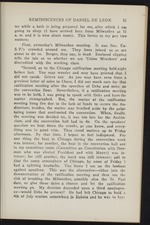 |
“... the convention. When, finally,
the meeting was decided on, it was too late for the Audito-
rium, and the convention hall had to do. On the speakers
question we beat down the crooks, as you know, and every-
thing was in good trim. Thus stood matters up to Friday
afternoon. By that time, I began to feel indisposed. For
one thing the heat in Chicago during the convention week
was intense; for another, the heat in the convention hall and
in my committee room (Committee on Constitution with Sher-
man who was elected President and with Moyer) was in-
tenser; for still another, the work was still intenser; add to
that the sooty atmosphere of Chicago, by noon of Friday I
had a splitting headache. You know I am on the lookout
against apoplexy. This was the alternativeeither join the
demonstration of the ratification meeting and then run the
risk of breaking the Milwaukee, possibly also the St. Paul
date, or give these dates a chance and let the ratification
meeting go. My decision depended upon...”
|
|
